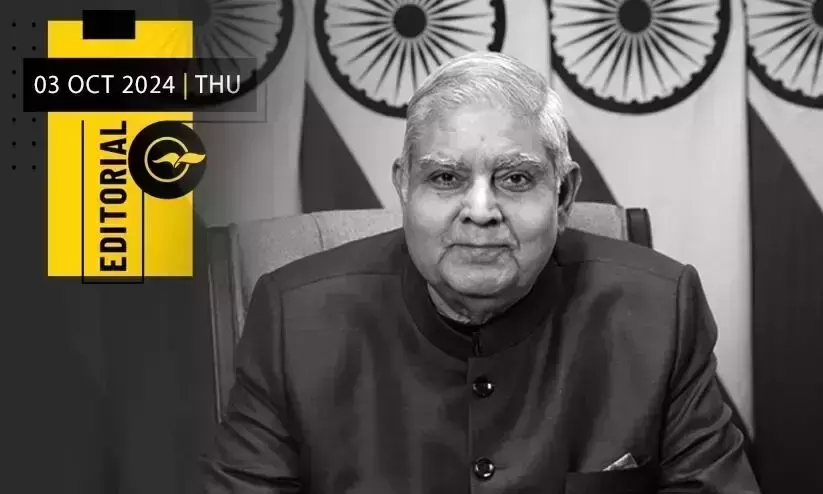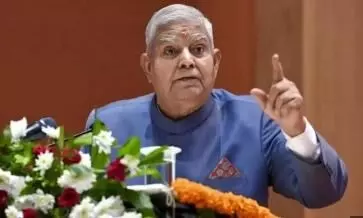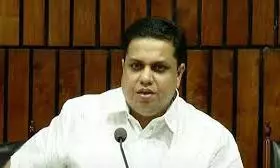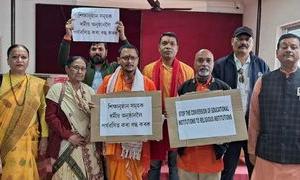
What the Vice President said - and left unsaid
text_fields“Our constitutional values emanate from Sanatan Dharma. The Preamble of the Constitution reflects the essence of Sanatan Dharma. Sanatan is all inclusive! Sanatan is the only way for humanity to move forward.” "Sanatana never spreads poison; it channels its own powers." These remarks were came not from a spiritual speaker, religious leader, or preacher. They are part of the inaugural address delivered by India's Vice President and Rajya Sabha Chairman, Jagdeep Dhankhar, at the five-day Hindu Spiritual-Seva Fair held last week in Jaipur.
As one having adorned constitutional positions including that of Union Minister, and Governor of West Bengal, and having worked in political parties, it is but natural for Dhankhar to have his own religious convictions and to have perspectives with his legal expertise shaped by his background as a constitutional lawyer. Accordingly, he can speak about Hinduism and the Constitution with his own perceptions. However, one may wonder whether equating India's identity as a secular nation, as enshrined in the preamble of the Constitution, with its origins in Sanatan Dharma is consistent with that identity. Sanatan Dharma is seen as fundamental by a large section of people in India, irrespective of religion or belief. There are also those who disagree with its aspects. However, when one theorizes that all these principles originated from the framework of Hinduism and that the Constitution is guided accordingly, that would amount to essentially giving an official veneer to the Hindutva nationalist claim that India's basic religion is Hinduism.
Dhankar, addressing an audience consisting of Hindu leaders, monks, and RSS workers, expressed concerns about several issues. In particular, he said, "...we are witnessing, very painfully, religious conversions in a structured manner as a policy, and this is antithetical to our values and constitutional principles." He also expatiated on the issue of conversions. "A sugar-coated philosophy is being sold. Vulnerable sections of the society, including tribals, are being targeted and lured with temptations," Dhankhar said. It's apparent that he was alluding to Christian missionary groups engaged in religious preaching and service activities among tribal and rural poor.
Hindutava proponents often level this accusation against the Christian church. The crux of the accusation is that the church lures the poor into their religion through temptations, and by building religious, educational, and health infrastructure, they fundamentally change the social structure. For one thing, it is the failure of the government's basic welfare activities that gives room for such a situation. More importantly, Article 25 of the Constitution guarantees the freedom to believe and practice any religion of one's choice, and also the freedom to propagate religion. Hearing and learning about other religions, if someone finds truth and goodness in that belief, accepting that belief is also part of the aforementioned freedom.
It is an offence to exploit the freedom of religion and convert people through inducements or by force. But for the government to prevent such conversions, which may arise from disagreements with certain rituals, practices, or affinity to other beliefs,then it would amount to denial of the freedom of religion and opinion. Almost ten states, including Madhya Pradesh and Uttar Pradesh, ruled predominantly by the BJP, have introduced anti-conversion laws. However, while these laws are created to prevent and punish conversions ostensibly by force of inducements, mobs, acting on mere suspicion, often take the law into their own hands, enforcing bans on religious conversions and even stopping and punishing interfaith marriages entered into with mutual consent. Shouldn't the Vice President, as the second citizen of India, have raised his voice against the creation of such an atmosphere of anarchy, hatred, and enmity? Instead, his concern lay solely with 'organised efforts' to convert people.
Vague judicial pronouncements and observations in such cases often lead to further confusion. Courts mostly are used to asserting that while religion can be propagated, this is not a licence for religious conversion. However, these statements, without a clear definition of what constitutes a punishable offence in religious conversion, sometimes result in injustice. The fact that state after state is enacting anti-conversion laws, which have become loopholes for misuse by vested interests, cannot be overlooked. The portrayal of religious conversion itself as a crime, under the guise of preventing 'forced religious conversion,' has become more prevalent since Hindutva-inspired governments began equating the nation with Hinduism. The citizenry now can only wish that when the Vice President, who is bound by duty to uphold the Constitution, and is conscious of its roots in Sanatana Dharma, will show similar vigilance also on the denial of rights and freedoms happening in that name.








